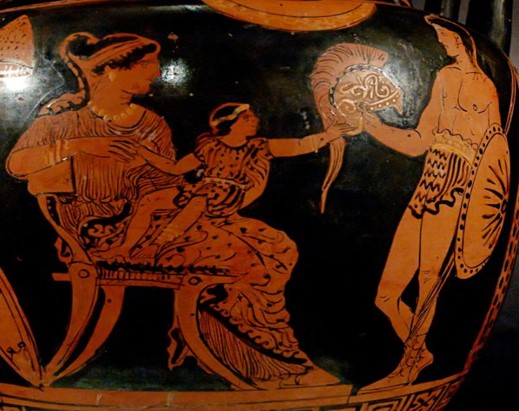Andromache is the daughter of Eetion, king of Thebes in the Mysia region. Eetion is bound by ties of friendship to King Priam. He gave his only daughter Adromakhe, whom he brought up with seven sons in his palace, to Hector, the most precious son of Priam. How was the wedding association? How did Andromache enter one of the houses with porticoes built for the sons and brides of Priam? Poets don’t tell us that. We do not know the happy days of this beautiful husband and wife. Hector and Andromache only appear on the scene of Troy in the ninth year of the war described in the Iliad, when destruction comes. In the meantime, they had a child: Astyanax. The Trojans gave this name to Hector’s son, which means “lord of the city”, in the hope that he will become king of Troy one day when the child grows up. But a few days before Hector’s death, Astyanax is a baby carried around in his nanny’s arms.
Andromache did not smile from mother, father, brother. When the sinister war came to the Anatolian shores, he did not feel comfortable in the Troy region. The Achaean army had been dozing in front of the gates of Troy for nine years, they could not bring down the sacred fortress of Anatolia. Especially the young and dashing Achilles, who couldn’t fit in, was very impatient. He could not express his bloodlust, even by chasing and killing the few Trojans who left the city to graze their cattle on the mountain slopes and ride their horses to the fountain at every opportunity. Achilles, who had gone on marauding expeditions in the region, had arrived in Mysia. He did not do what he did in King Eetion’s palace, he killed the old-headed king and mercilessly took the lives of his seven sons. Nor did he spare Andromache’s mother. “My mother was a queen at the foot of the forested mountain Plakos,” says Andromache to the side; Achilles had also taken the queen into the herd of captives, brought her to Troy, and then released her in exchange for a great redemption, but the poor woman died as soon as she saw her “free day,” as Homer said.
Andromache spends her time in the women’s quarters in the Troy palace, embroidering and shuttlecocking among her maids. She is a torment day by day, because fear grips her heart, she fears that Hector, however valiant, will one day die under the spear of the enemy. While the braves are struggling on the plain of Troy, they cannot stand comfortably between four walls. He gives his child to the nanny and goes up to the tower above the west gate to watch the war. One day, Hector takes a break from the war and comes to the city, looking for his wife at home, he runs to the western gates, smiling when he sees Andromache and her baby from afar. Andromache sheds tears and hugs her hands (Il. 407 et al.):
Oh my husband, this greed will eat you,
You have no pity for your child, your unfortunate wife,
not to be a widow, I know, few days are left,
The Achaeans will attack you and kill you.
Rather than being without you, it would be better for the earth to swallow me.
I have no other support than you,
when death takes you away
Only pain will remain for me.
I have neither my father, nor my great mother…
You are a father to me, Hector,
You are my great mother, you are my brother,
You’re a friend of my warm bed.
Stay here in the castle, have pity on me,
orphan coma our baby, your wife widow coma.
This torture will last nine days: Every morning, Achilles ties the dead body to his car and drags it. In the evening of the tenth day, King Priam goes to Achilles’ hut, softens his heart and takes the dead. At Hector’s funeral we see Andromache now. The lamentation begins among the poets, saying (Il. XXIV, 725 ff.):
Hector takes pity on his wife, but what can he do, he will not withdraw from the war like a coward? The support of the Trojan army is its base.
Days pass, a one-on-one battle begins between Hector and Achilles. The battle for life and death is the most dramatic scene of the Iliad. The gods decided Hector’s death. He dies by fighting bravely. A cry breaks from the walls of Troy, Andromache hears this vaveyla while he is spinning in his room, he jumps out like crazy; When he sees the dead body of Hector, which Achilles tied to his car and dragged in dust, he falls and faints.
My man, you passed away at a young age,
You left, you left me a widow in our house,
Our child is also tiny, young,
one of us, the two of us who are unfortunate,
I don’t know, will it reach my youth?
This city will be destroyed from top to bottom,
you are dead, its protector, keeper,
you, my noble mothers, their children standing
holding…
You left unspeakable pain, Hector,
to your parents, but to me, the greatest pain remained.
You didn’t stretch your hands on your deathbed
to me,
You didn’t say such a nice word,
shedding tears day and night
I am her mother.
Indeed, Andromakhe’s suffering is endless.
In Euripides’s tragedy “Andromache”, we see him in the palace of Achilles’ son Neoptolemus. He married Hermione, the daughter of Neoptolemus Menelaos, but he had no children, whereas Andromache, whom he brought to his mansion as a prisoner, gave him three sons and a daughter. Hermione is very jealous of this Trojan woman, taking advantage of Neoptolemus’s departure to Delphi, Andromache and her son; They want to kill him, although they took shelter in the temple of Themis, they will slaughter them so that they are saved at the last minute.
The poet XVII, who created a much more beautiful and humane type of Andromache than Euripides. century French poet Racine. A valiant and conscious woman, who cannot forget Hector, who does not return the love of Neoptolemus (her name is Pyrrhus in French tragedy) and who overturns Hermione’s jealousy, is a compassionate main type.
In Jean Anouilh’s play “La Guerre de Troie n’aura pas lieu” (There will be no Trojan war), Andromakhe comes to life as an interesting and attractive type.






















